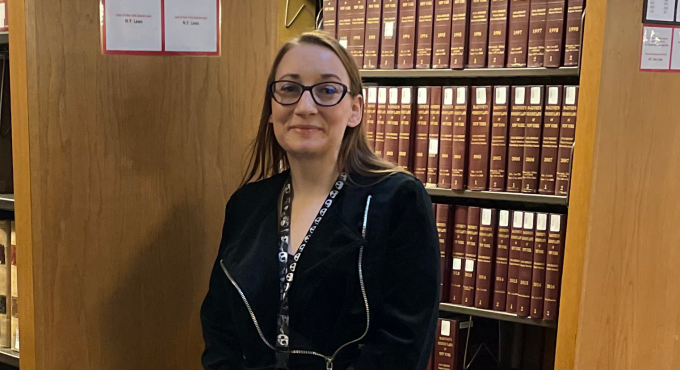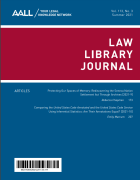
Amplifying historical indigenous voices
Rebecca Chapman, senior assistant law librarian, wins outstanding scholarship award
Before she pivoted to law librarianship, Rebecca Chapman spent 16 years as a legal practitioner specializing in Indian law and Native American rights. In Western New York, home to the Seneca Nation, her research has found a wealth of materials on the fraught relationship between tribal governments, state governments, and the federal government.
Now the American Association of Law Libraries has recognized Chapman’s scholarship by presenting her with the Law Library Journal Article of the Year Award. The award recognizes her article—“Protecting Our Spaces of Memory: Rediscovering the Seneca Nation Settlement Act Through Archives,” published in the journal’s summer 2021 issue—for its outstanding scholarship and its contribution to law librarianship.
The 31-page article (plus a historical timeline and three maps from the turn of the 19th century) looks deeply into the Charles B. Sears Law Library archives to explore the history of the Seneca Nation Settlement Act, the 1990 law that empowered the Seneca Nation to renegotiate with the City of Salamanca its long-disputed leases of tribal land.
Beyond a thoroughgoing history of the evolution of the land leases and the settlement act, Chapman’s article explores the idea of archives as spaces for maintaining and expanding historical memory, arguing that they can give voice to sometimes overlooked players in that history.
“Archival space is meant to collect and retain a snapshot in time of specific events and places and people,” Chapman says, “but that snapshot is incomplete if we don’t allow it to continue to evolve and expand with the viewpoints of other peoples and other communities that would have had a say in those events and those places. An archive creates a memory space, but that memory space may not always be fully accurate or as thorough as it could be if it contains a bias or the absence of a particular voice, in this case an indigenous voice.
“I really wanted to highlight that archives are not static—they evolve. We can enrich that space of memory, expand it, make it grow and make it more robust by adding indigenous voices and perspectives. If we’re considering a library as an almost living thing that involves and welcomes the community, we have to be mindful that indigenous communities are part of our community.”
Chapman, who has a JD from the University of Minnesota Law School and her master’s degree in library and information science from UB, says the law library collection includes two rich collections of materials on indigenous peoples. The Howard Berman Collection comprises papers and other materials from an attorney whose work included cases on the land rights and sovereignty of the Seneca and Tuscarora people. The Marilyn Haas Collection was bequeathed to the university by a librarian who amassed a substantial personal collection of Indian materials. “It contains some really fantastic pieces,” Chapman says, “including some of our most extensive maps of the Seneca Nation and territories in the 1700s and 1800s. You can see the overlapping claims that white settlers tried to assert on Seneca Nation territory.
“I was trying to highlight what’s in those archives,” she says, “and why we need to protect and celebrate what’s in there. It’s incredibly important to highlight protecting what’s in that space.”
“Chapman’s award-winning article reminds us that archives are treasure troves of historical resources,” says Elizabeth Adelman, vice dean for legal information services and law library director. “Through her lens, we learn the importance of integrating more voices and perspectives into archival collections to provide a balanced memory of the past.”
Chapman’s work includes outreach to the university’s indigenous studies program as well as the law school’s new undergraduate program in law. “Part of the model, from my perspective as a librarian, is not being passive and waiting for questions to come to you,” she says. “It’s really about focusing on reaching out and asking after people’s needs, what they need for support and what they’re looking for, what their vision is. That’s what drives my work.”
The archive as a memory space
Excerpt from Rebecca Chapman’s prizewinning article in the Law Library Journal:
Legal archives, or those memory spaces by which we record laws and their changes, aid researchers in understanding the legal landscape across time and how it impacts the community. Creating a legal archive and formatting that archive can shape the memory of the law and how it evolves over time. In short, the archive as a memory space helps crystalize what we know about the law and how we understand it.
An archive contains traces of legal memory, like legal writing and draft legislation, but it also impacts future interpretations and how researchers will note any process of legal evolution. That is because archives show us the relationship between memory and justice. Justice requires that we do not forget what has come before. To successfully find justice, we must strive for it and seek it out. To that end, we must remember the law and its impacts on communities who lack a voice in the main political arena. Law attempts to represent justice, but it cannot do so with inadequate memory. We need archives to aid our memory and instantiate justice.
